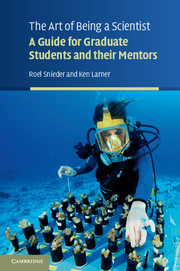Book contents
- Frontmatter
- Contents
- 1 Introduction
- 2 What is science?
- 3 Choices, choices, choices
- 4 The adviser and thesis committee
- 5 Questions drive research
- 6 Giving direction to our work
- 7 Turning challenges into opportunities
- 8 Ethics of research
- 9 Using the scientific literature
- 10 Communication
- 11 Publishing a paper
- 12 Time management
- 13 Writing proposals
- 14 The scientific career
- 15 Applying for a job
- 16 Concluding remarks
- Appendix A Further reading
- Appendix B A sample curriculum
- Appendix C The Refer and BibTeX format
- References
- About the authors
- Index
4 - The adviser and thesis committee
Published online by Cambridge University Press: 05 June 2014
- Frontmatter
- Contents
- 1 Introduction
- 2 What is science?
- 3 Choices, choices, choices
- 4 The adviser and thesis committee
- 5 Questions drive research
- 6 Giving direction to our work
- 7 Turning challenges into opportunities
- 8 Ethics of research
- 9 Using the scientific literature
- 10 Communication
- 11 Publishing a paper
- 12 Time management
- 13 Writing proposals
- 14 The scientific career
- 15 Applying for a job
- 16 Concluding remarks
- Appendix A Further reading
- Appendix B A sample curriculum
- Appendix C The Refer and BibTeX format
- References
- About the authors
- Index
Summary
Throughout their careers, scientists work with others. This is particularly so for students during their time in graduate school. As a graduate student, among those with whom you can expect to interact variously throughout your graduate-school career – your academic adviser, faculty members on your thesis committee, other faculty members from both within and outside your home department, fellow students, and scientists elsewhere whose work and ideas can be of value to you – it is your academic adviser (thesis adviser) who can be expected to influence most directly the course, for good or ill, of your graduate experience. In Chapter 3 we discussed the many choices that researchers, in particular, beginning graduate students, must make in order to focus their research and, for graduate students, to complete their educational and research program in a reasonable amount of time. The choice of the adviser and the related choice of a research topic are essential not only for the successful completion of graduate studies, they can also influence the way in which the academic career develops, and even the course of one's subsequent scientific career. In order to make informed choices, it is necessary to understand the roles – both academic and personal – of the scientific adviser, with whom you can expect to spend many hours. We describe those roles in this chapter, along with the related role of the thesis committee.
- Type
- Chapter
- Information
- The Art of Being a ScientistA Guide for Graduate Students and their Mentors, pp. 53 - 64Publisher: Cambridge University PressPrint publication year: 2009



